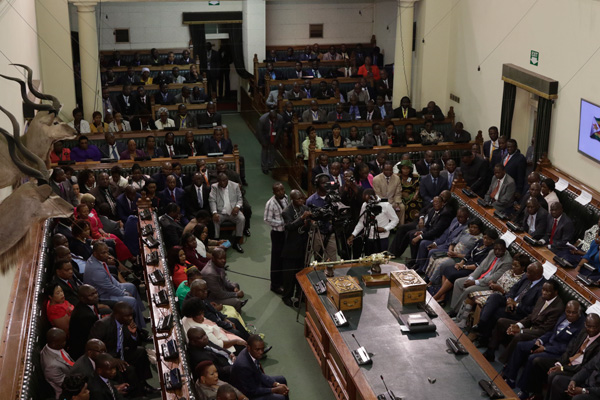
PARLIAMENT will this week begin to gather people’s views on the Electoral Amendment Bill and the Insolvency Bill.
by VENERANDA LANGA/BLESSED MHLANGA
In the past public hearings on electoral law amendments were marred by violence due to the emotive nature of electoral issues. But chairperson of the Parliamentary Portfolio Committee on Justice Ziyambi Ziyambi yesterday told journalists during a media briefing in Parliament that this time they will ensure there is no intimidation.
“The Electoral Amendment Bill is aimed at improving electoral laws and if members of the public feel there is a certain section that should be improved we will take their views and incorporate them in a report which the committee will present before Parliament,” Ziyambi said.
“We do not want violence and we will be very strict, and have indicated already that we do not want people that will come to the public hearings clad in political party regalia or chanting slogans, and we are going to take measures to ensure that people are allowed to say whatever they want freely.”
Ziyambi said the current amendments to the Electoral Act are meant to ensure the smooth running of the new registration system of voters as presented by President Robert Mugabe in Statutory Instrument (SI) 109 of 2017, and where he used the Presidential Powers (Temporary Measures) Act to give effect to provisions of the new biometric voter registration (BVR).
However, the Presidential amendments will only be valid for 180 days, and so the new amendments in the Electoral Amendment Bill will give effect to Presidential amendments beyond the 180 days.
Institutions such as Veritas already think that the Electoral Amendment Bill’s scope in its current form is very limited and must be expanded in order to include punitive measures on political parties that perpetrate voter intimidation.
- Chamisa under fire over US$120K donation
- Mavhunga puts DeMbare into Chibuku quarterfinals
- Pension funds bet on Cabora Bassa oilfields
- Councils defy govt fire tender directive
Keep Reading
“The Bill’s scope is extremely limited, as it deals only with a few aspects of voter registration and one related matter, and it does not tackle the many other defects in the Electoral Act, which include provisions that are not compliant with the Constitution,” Veritas said in their latest edition of Bill Watch.
On the Insolvency Bill, Ziyambi said it is one of the Bills expected to improve ease of doing business and will repeal the Insolvency Act.
He said in the past it would take up to 45 months to deal with insolvency cases, but the Bill seeks to ensure that it is reduced to less than 12 months.
The committee will gather people’s views on the Bill in Mutare, Masvingo, Kadoma, Bulawayo and Harare.
Meanwhile, the Zimbabwe Elections Support Network (Zesn) has rapped government for crafting proposed amendments to the Electoral Act [Chapter 2:3] which fall far short in guaranteeing the Act is in line with the Constitution.
In a brief analysis of the Bill, Zesn said despite being amended three times since 2013, the current Bill before parliament was narrow and did not address fundamental issues in the Constitution and it also fell far short in guaranteeing a free and fair election.
“The passage into law or otherwise of this Bill will not resolve the broader problem of incomplete and piecemeal amendments to the electoral law. Despite the latest proposed amendments, it is submitted that several legal provisions in the Electoral Act still require revision to bring them in line with the Constitution.
“The existence of potentially unconstitutional provisions within the Electoral Act and other relevant legislative pieces has a bearing on the holding of a free, fair, peaceful and credible election as envisaged by the Constitution and the Sadc principles and guidelines governing the conduct of democratic elections,” said Zesn.
The Bill which looks at introducing BVR and remove at law the involvement of the Registrar General in the management of elections leaves out fundamental voting rights of prisoners and diasporans.
“The Bill falls far short in addressing issues that have a bearing on the holding of a free, fair and credible election such as addressing the question of the right to vote of categories of voters that include prisoners, the infirm and the people in the diaspora, in accordance with Section 67 of the Constitution. Ensuring the Accreditation Committee of Zimbabwe Electoral Commission constitutes members who are Zec Commissioners in line with Section 239 of the Constitution,” Zesn said.
Currently people in the diaspora can only vote if they are physically present in Zimbabwe and cannot vote from their bases.











